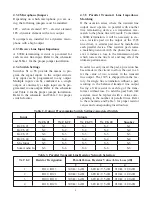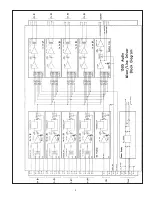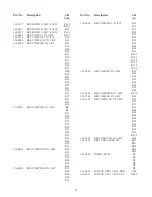
4.3.2 Microphone Jumpers
Depending on which microphone you are us-
ing, the following jumpers must be installed:
JP2 - carbon element; JP3 - electret element;
JP4 - dynamic element with a low output.
No jumpers are installed for a dynamic micro-
phone with a high output.
4.3.3 Receive Line Input Impedance
A 600
Ω
terminating resistor is provided for
each receive line input. Refer to the schematic
and Table 1 for the proper jumper installation.
4.3.4 Switch Settings
Switches S1 to S5 provide the means to pro-
gram the signal inputs to the output circuits.
Any input can be programmed to any output.
Multiple inputs can be combined to a single
output, or conversely a single input can be pro-
grammed to one output. Refer to the schematic
and Table 2 for the proper jumper installation.
Refer to the schematic and Table 2 for proper
switch closures.
4.3.5 Parallel Transmit Line Impedance
Matching
If the occasion arises where the transmit line
output must operate in parallel with another
line terminating device, an impedance mis-
match to the phone line will result. To maintain
a 600
Ω
termination, it will be necessary to cre-
ate a resistive pad on the output of the 1505
line driver. A similar pad must be installed in
each parallel device. This resistive pad creates
a matching network with the phone line, how-
ever it induces a loss in the transmission path
which lowers the line level and may affect the
ultimate performance.
In order to easily insert the pad, a provision has
been made in the circuit to allow the user to al-
ter the value of two resistors in the transmit
line output. The 1505 is shipped from the fac-
tory for single line termination without a pad,
resulting in the balanced transmit line output
having a 0
Ω
resistor in each leg of the trans-
former without loss. To add the pad, both 0
Ω
resistors must be replaced with a value corre-
sponding to the number of parallel lines. Refer
to the schematic and Table 3 for proper resistor
values and corresponding insertion loss.
Table 2. Output Programming Switch Settings/Associated Switch
Table 3. Parallel Transmit Line Resistor Network Selection
4
Input
Outputs
Tx Ch #1
Tx Ch #2
Tx Ch #3
Tx Ch #4
Speaker
Rx Ch #1
S-1
S-1
S-1
S-1
S-1
Rx Ch #2
S-2
S-2
S-2
S-2
S-2
Rx Ch #3
S-3
S-3
S-3
S-3
S-3
Rx Ch #4
S-4
S-4
S-4
S-4
S-4
Mic Input
S-5
S-5
S-5
S-5
S-5
Sum Audio In
S-6
S-6
S-6
S-6
S-6
Tx Ch #
Resistor Designation
Parallel Lines, Resistor Value / Line Loss (dB)
2
3
4
1
R112, R113
300
Ω / 6
dB
620 Ω / 9.5
d
Β
910 Ω / 12.0
d
Β
2
R119, R121
300
Ω / 6
dB
620 Ω / 9.5
d
Β
910 Ω / 12.0
d
Β
3
R109, R110
300
Ω / 6
dB
620 Ω / 9.5
d
Β
910 Ω / 12.0
d
Β
4
R118, R120
300
Ω / 6
dB
620 Ω / 9.5
d
Β
910 Ω / 12.0
d
Β



































